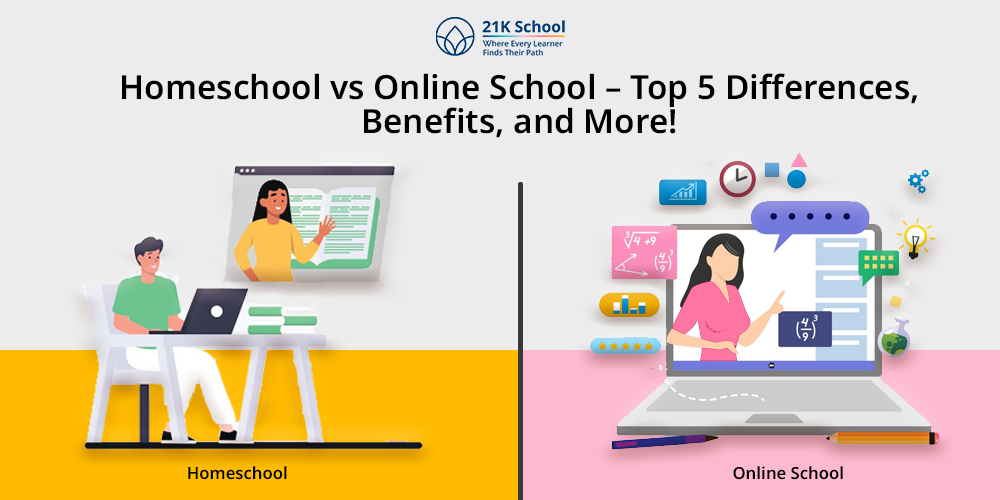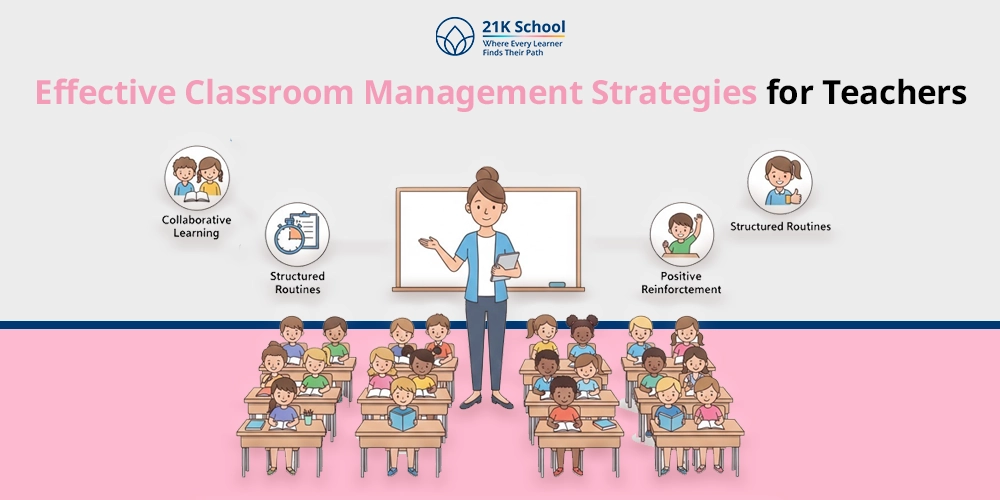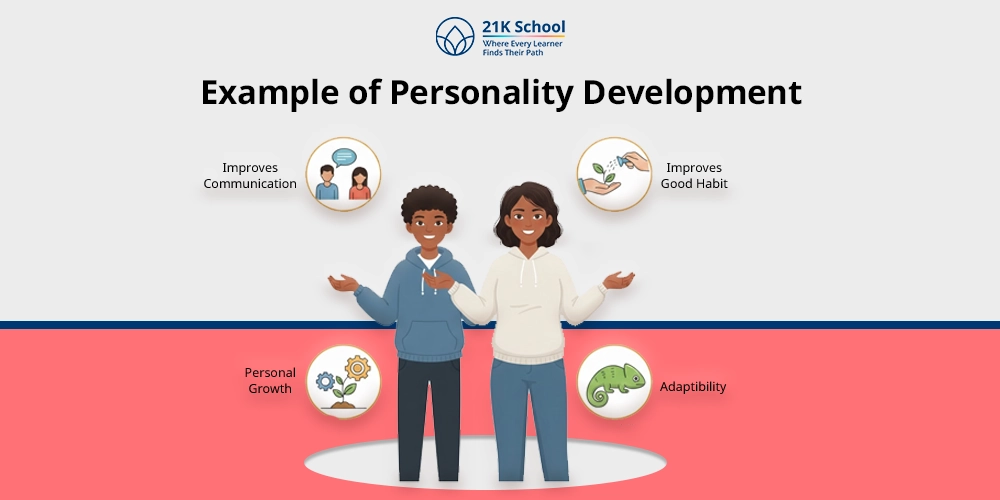
Ever wonder how homeschooling differs from online school?
Homeschool and online school are different aspects of education related to distance education. Both terms are related to each other, but are not the same.
Homeschooling is an educational methodology in which students learn at their own homes with or without using any virtual learning platforms. Homeschooling also requires parents’ support and tutors.
On the other hand, online schooling is an educational aspect in which students attend their classes from home with the help of e-learning platforms. In online schooling the teacher conducts classes similar to the traditional schooling method but with the help of video conferencing.
Both homeschooling and online education can ultimately provide a valuable educational experience but it’s important to find the approach that best fits the child’s needs and the family’s values.
Table of Contents
What is Homeschool?
Homeschool is an educational approach which provides flexibility to students to study from their own home instead of going to physical schools.
In homeschools, parents teach their childrens instead of sending them to a physical school. Homeschool provides a flexible learning opportunity, which develops creative thinking skills and promotes self directed learning among students..
In homeschooling, parents acts as teacher to teach their children at home withthe help of books or internet resources. Homeschooling provides a customised learning experience that is tailored to the requirements, interests and learning styles of every child, allowing families and students to choose when and where to study at home.
Homeschooling provides more control over the learning environment and study schedule, which can result in a personalised approach to education.
What is Online School?
Online school can be defined as a school in which all the classes take place with the help of the internet and e-learning platforms. Online schools provide the benefits of personalised learning and are known for their flexibility, which allows teachers to provide students with customised learning.
In online schools, students can attend their classes with the aid of the internet and technology from the comfort of their own home. Online education method provides the flexibility of providing students with both synchronous and asynchronous learning experiences.
With the help of online education students can learn at their own pace and cultivate a passion for learning. Online learning enhances students engagement with the help of interactive simulations, multimedia content and a range of learning resources.
Homeschool vs Online School- Key Differences
Homeschooling and online schooling are two different aspects of flexible and personalised education.
Both Homeschooling and online schooling have some similar educational aspects such as remote learning opportunities. Here are the differences between Homeschool and online schools.
| Aspect | Homeschooling | Online schooling |
| Structure | Homeschooling is less structured as students do not have to follow any learning structure they can study at their own home according to their own style. | Online schools provide flexibility but it has a structured learning environment. In online learning students attend scheduled classes, assessments, and project work, within a time frame. |
| Parental Guidance | In homeschooling parental support is the most important aspect. Parents plays an essential role in managing and guiding the studies of their kids. | Online schooling does not require parental guidance as students can study with the help of teachers, as teachers conduct the classes with digital mediums. |
| Curriculum | Homeschooling doesn’t have any fixed curriculum and it depends upon their parents which curriculum to choose. | Online school also provides a customised curriculum, but has a structured learning environment which mostly provides Indian and International curriculum. |
| Cost | Homeschooling is affordable as it doesn’t include any teachers or physical resources, which eliminates the cost related to schools. | Online schooling is also affordable, but as compared to homeschooling it is expensive. In online schooling, students need to enrol in the classes and have to buy technical resources, which may be costly. |
| Collaboration | Homeschooling doesn’t provide any collaboration as students study on their own. | Online school provides cooperative learning through online group projects, feedback, live classes and so on, which enhances teamwork among them. |
Here you can check the detailed differentiation of homeschooling vs online schooling.
1. Structure
Homeschool
Homeschool doesn’t have a structured learning environment due to which students can learn in a flexible learning environment. This flexibility allows students to study as per their own convenience and makes education less stressful.
Online School
Online schools are also flexible and personalised but it has a structured learning environment. Online classes have scheduled classes, assessments, and project work, in which students have to complete it within a time frame.
2. Parental Guidance
Homeschool
Homeschooling requires parental support and guidance. When parents homeschool their children, they act as teacher who supervise and guide their childrens education.
Online School
In online school, parental involvement may be not required as online teachers can teach the children. In online learning, teachers conduct the classes with all the resources via digital mediums. However, parents can also provide support and guidance to their children.
3. Curriculum
Homeschool
The curriculum of homeschool is flexible as parents can decide which curriculum they will prefer and provide. Even a customised curriculum can also be provided by their parents, which enhances the learning outcome of children.
Online School
Online School also offers flexible curriculum choice, but it can’t be customised. In online schools, mostly international and Indian curriculum were provided, in which students had to select their preferred curriculum based on their learning goals.
4. Expenses
Homeschool
Homeschooling is affordable as mostly parents teach their children, it doesn’t include any teachers or physical resources. This makes education more inexpensive and more accessible, allowing every child to learn on their own.
Online School
Online schooling is also affordable, but as compared to homeschooling it is expensive. With the contribution of technology in education, online learning has become less expensive. However, to indulge in online learning, students need to buy technical devices such as the Internet, a computer or need to buy software, which can be a little expensive.
5. Collaboration
Homeschool
In homeschool, there is no opportunity for collaboration, as students are learning on their own isolatedly. Due to the absence of a collaborative learning environment, students find it difficult to socialise with others, which also hinders their communication skills.
Online School
Online Schools uses real time video conferencing techniques, which offers a collaborative learning environment allows students to connect with others in real time. Through online learning students can also participate in online group projects and assessments, which enhances team work and socialisation among them.
5 Benefits of Homeschool
Homeschooling provides a wide range of advantages that allows them to take control of their education. Homeschooling allows students to learn at home without attending physical classes.
This flexibility improves their ability to understand information more rapidly by assisting them in concentrating on extracurricular activities in addition to their studies. The below are the benefits of homeschooling.
1. Self-paced Learning
Homeschooling promotes self-paced learning, problem solving which allows children to learn at their own pace, which enables them to finish topics they understand more quickly and devote more time to subjects they find challenging.
Through self-paced learning students can take longer time to understand difficult concepts, which also allows them to develop lifelong learning and autonomy towards their education.
2. Academic Flexibility
The academic flexibility of homeschooling allows students to study as per their comfortability and learning schedule. The flexible nature of homeschooling allow students to create a study routine that suits them, which allows them to utilise time more effectively.
Students who have other responsibilities or have any physical challenges, or want to indulge in experiential learning opportunities to gain hands-on experience, will benefit through academic flexibility.
3. Suitable for Working Parents
Homeschool allows working parents to balance both their professional responsibilities and their childrens education. The suitability of homeschooling allows parents to actively participate in their childrens education while still managing their jobs, which encourages dynamic learning.
Additionally, it enables parents to engage their kids in work-related activities or teach them problem-solving techniques.
4. Customised Curriculum
Homeschooling provides customisation of curriculum tailored to the child’s interests, learning style and strengths.
By adapting the curriculum to the child’s interests and utilising resources and teaching methods that suit them a more engaging and positive learning environment can be produced. The curriculum can be adjusted by parents to keep learning interesting and up to date as their child grows and their needs change.
5. Safe Learning Environment
Homeschooling provides a safe and supportive learning environment, which eliminates some of the difficulties and demands that can occur in traditional learning environments, such as bullying, peer pressure, racial problems in schools and so on.
Children can concentrate on their studies without interruptions in this secure environment, which also fosters social-emotional learning.
5 Benefits of Online School
Online schools are known for various benefits such as flexible education, self paced learning, equal accessibility and so on. Online schools provide students to study as per their own study schedule allows them to focus on other activities. Here are the benefits of online schools.
1. Flexible Learning
Online education offers schedule and learning environment flexibility. By using the course materials and having the flexibility to complete assignments at their own pace students can manage their education with other commitments such as part-time jobs, extracurricular activities or family responsibilities.
2. Cost Effective
Online education is more cost-effective than traditional schooling. Because the costs of extracurricular activities, school supplies and transportation that are normally associated with traditional classroom instruction are eliminated when lessons are delivered online.
Also, online classes are less expensive than traditional schools because most of the resources are free or have lower fees such as textbooks and PDFs.
3. Enhance Career Opportunities
Online school provides a wide range of courses and programs, including practical subjects, which help in advancing the career opportunities of students.
A wide range of online schools provides various specialised programs including vocational training and certifications. The programs focuses on enhancing the digital literacy, self-discipline and collaboration skills are among students.
4. Time Management Skills
Students can improve their time management skills by attending online schools. This is because students can manage their time, prioritise their tasks and set objectives, which makes them time punctual.
Time management skills are not only important for academic objectives but are also essential for personal and professional contexts.
5. Personalised Learning
Students can customise their educational experience by using online courses, which allow them to choose their own study schedule and learning preferences.
Since each student learns differently, individualised learning offers the advantages of allowing them to focus on their strengths and areas of interest. The benefits of personalised education enable students to concentrate on their areas of weakness and enhance their learning outcomes.
Ending Note
Distance learning can be divided into two categories: homeschooling and online learning. A personalised curriculum and a safe learning environment are made possible by homeschooling, which places an emphasis on parental involvement and flexibility.
On the other hand online education encourages flexibility and individualised learning by leveraging technology to offer a variety of resources and structured classes.
Ultimately, each child’s needs, family values and educational objectives will determine which of the two approaches is best. Through self-directed learning and parental guidance, a child’s education can be effectively supported.



